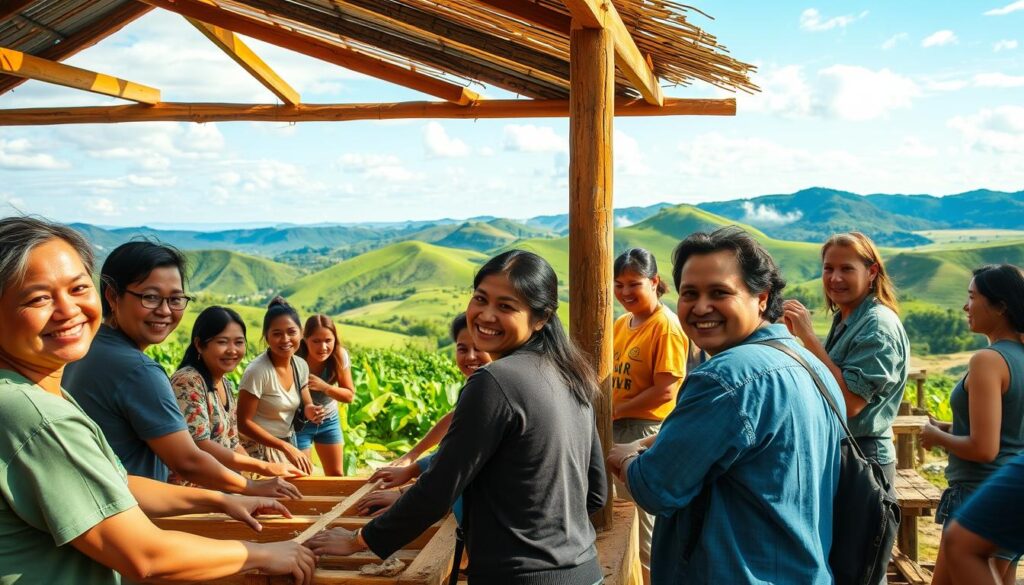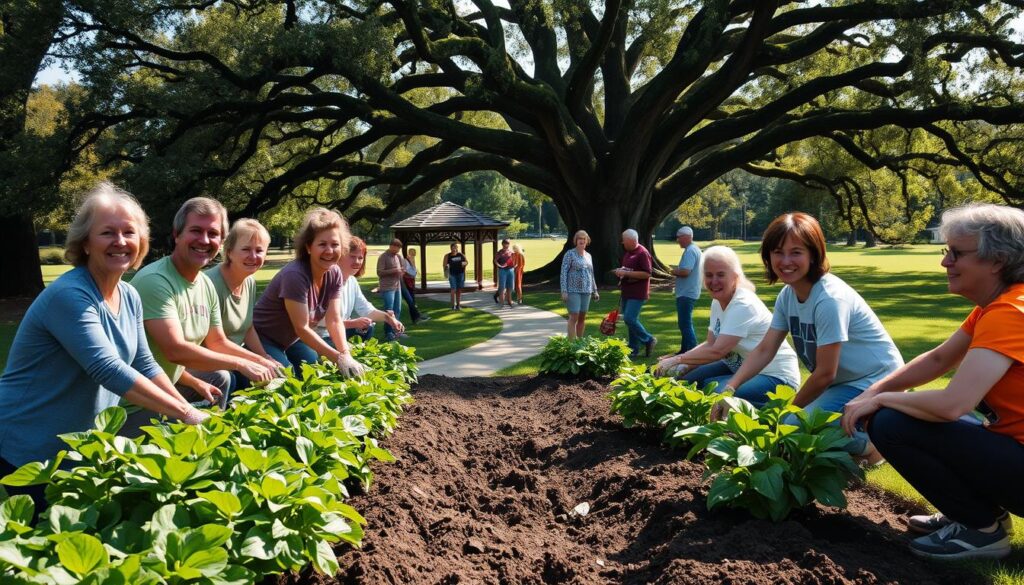The worldwide volunteer tourism population reached more than 1.6 million annually. As the trend increases people can experience travel excitement while fulfilling their desire to make beneficial changes. Participants discover an experience beyond travel as they gain the capability to produce enduring outcomes.
Volunteer tourism
Volunteer tourism which is also known as voluntourism has become a substantial means by which people explore different regions of the world. Through this form of travel people can explore different cultures by actively participating in community progress. Such a distinctive combination between adventure and service has transformed people’s outlook on leisure activities.
The volunteer tourism field provides participants a wide range of experiences starting from education work in rural schools through wildlife preservation activities. The true value of traveling exceeds physical destinations because it lets people leave a positive mark on lives. This discussion outlines the historical development of voluntourism while explaining current practices together with details about becoming an active participant.
Key Takeaways
- The combination of community service and tourism activities defines volunteer tourism.
- This expansionary movement currently attracts more than 1.6 million volunteers each year.
- Travelers have opportunities to make substantial differences as they discover foreign societies.
- The field of voluntourism offers multiple service sectors between teaching and conservation programs.
- The article shares knowledge through success examples while offering applicable methods.
Introduction to Volunteer Tourism
Since ancient times people have combined travel with the purpose of service. Since antiquity people have integrated their exploration of new cultures with charitable endeavors. Voluntourism emerged as a fusion of travel and important community work from the fundamental concept.
The worldwide volunteer tourism population reached more than 1.6 million annually. The rising travel trend enables people to experience adventure during their trips while achieving meaningful service goals. Participants discover an experience beyond travel as they gain the capability to produce enduring outcomes.
Volunteer tourism:
Volunteer tourism which is also known as voluntourism has become a substantial means by which people explore different regions of the world. Through this form of travel people can explore different cultures by actively participating in community progress. Such a distinctive combination between adventure and service has transformed people’s outlook on leisure activities.
The volunteer tourism field provides participants a wide range of experiences starting from education work in rural schools through wildlife preservation activities. The true value of traveling exceeds physical destinations because it lets people leave a positive mark on lives. This discussion outlines the historical development of voluntourism while explaining current practices together with details about becoming an active participant.

Thoughtful preparation at the beginning of any purposeful journey serves to create meaningful effects. Proper planning stands essential both when you support community development or protect the environment. The subsequent part offers concrete guidance to ensure your preparation success.
Personal growth demands harmony with the delivery of genuine service.
The main struggle exists in preventing personal advancement from surpassing community requirements. According to expert Scott Freeman who studies service travel the key attention point should remain dedicated to community requirements instead of only catering to traveler satisfaction. A proper alignment of personal fulfillment with genuine service makes it possible to generate positive results.
Non-professional participants within these experiences have an unfavorable effect on advancement. The lack of appropriate skills combined with insufficient local practice knowledge in building projects typically results in poor-quality outcomes. Avoiding such issues becomes possible through proper preparation along with proper alignment to local initiatives.
Efforts should focus on eliminating the power disparities that exist between communities and Western do-gooders.
Hazardous stereotypes tend to replicate due to the lack of sufficient attention in this area. When Western saviorism becomes a concept it ends up creating local dependencies that reduces local leadership strength. Such practices generate dependency instead of community empowerment through continual external aid.
The solution requires program initiatives to adopt both cultural sensitivity and community development practices. The combination of focusing on local requirements with member participation in decision-making processes makes service travel an instrument that develops true empowerment.
You need to understand both the moral problems and solutions associated with service travel.
Personal development initiatives must always be consistent with the requirements of the community.
Service programs should prevent the strengthening of harmful generalizations and prevent becoming a crutch.
Organizations should maintain sustainable operations through cultural respect.
The Process of Getting Ready for a Purposeful Volunteer Engagement
Thoughtful preparation at the beginning of any purposeful journey serves to create meaningful effects. The key element for making successful contributions to community development or environmental conservation work lies in proper planning. The subsequent part offers concrete guidance to ensure your preparation success.
Case Studies from Global Volunteer Projects
The Colombian forest rehabilitation project united both residents and visitors for the purpose of regenerating damaged territories. The project achieved its biodiversity and livelihood improvement goals by using research methods to plant 10,000 trees. The collaboration of community members together with professional knowledge demonstrates the true strength of organization.
The New Orleans recovery efforts concentrated on restoring houses as well as educational centers. Members of the community joined forces with volunteers to perform joint activities that created mutual understanding and common objectives. The implemented projects combined short-term need management with long-term resilience enhancement efforts.
The health education program in Ghana selected local volunteers to implement a hygiene practice teaching initiative. The initiative brought power to community members who kept the positive effects expanding throughout the community thus ensuring lasting sustainability.
Innovative Approaches and Alternative Break Programs
American University operates Alternative Break programs which combine education with meaningful reflection practices. The program brings participants directly into projects that also educate them about community concerns. The method promotes better comprehension of worldwide difficulties together with mutual acceptance between different cultures.
The water sanitation project in Honduras implemented technology to deliver clean water to remote areas of the country. The initiative succeeded through its inclusion of local leadership during planning stages which created successful results and preserved cultural values.
The wildlife conservation programs in South Africa implemented scientific research together with volunteer participation to protect animal species. Investing thought in designing projects together has resulted in protecting endangered species as well as providing environmental sustainability education to participants thus showing how well-planned collaboration generates meaningful change. Through its emphasis on local requirements and international cultural relationship growth service-driven tourism continues developing its role as a worldwide advancement resource.
Conclusion
The act of traveling gives society an opportunity to reshape the existence of people who explore along with those who reside in visited areas. Service-based travel when combined with personal development enables transformative change which supports understanding between individuals from different backgrounds. Each vacation destination provides specialized platforms which enable tourists to leave a good influence on society.
You need to perform thorough research and development work to develop travel plans which correspond with local concerns. Your meaningful contribution to worthwhile projects depends on respecting cultural traditions and choosing sustainable priorities. This path enables both positive changes in your life and successful project involvement. The numerous success stories mentioned in this publication will motivate future volunteers to participate.
Travel provides people with both discovery experiences and the chance to construct positive transformations worldwide. The combination of thorough preparation and dedicated service work enables all travelers to make enduring beneficial impressions in the world.

FAQ
What is voluntourism?
People who participate in voluntourism use tourism activities to actively support local communities while visiting new places around the world. The approach emphasizes collaborative positive change by exploring different cultures and maintaining sustainable operations.
How did voluntourism gain popularity?
The increase of voluntourism started appearing during the 1990s when travelers desired more meaningful connections with their travel locations. Service travel became increasingly popular as people began seeking both reasons to grow themselves while making positive changes within communities.
The combination of traveling with service activities provides multiple advantages to tourists.
People who combine travel with service receive two advantages because they learn cultural specifics while making valuable contributions to community programs. Voluntourism establishes respect between people while creating sustainable benefits through long-term change in communities.
I need to understand the steps for establishing my voluntourism trip as ethical.
Read up on reliable organizations that support voluntourism programs then examine local needs before selecting projects which do not create power structures between guests and people in the area. The approach should involve collaboration instead of implementing external solutions.
Which aspects need attention when arranging a voluntourism travel experience?
Begin your planning by looking for service initiatives related to your abilities and specialty areas. People should design their travel schedule properly while supplying necessary items along with dedicating time to learn about traditional cultural practices of the destination.
Success stories exist among projects involving voluntourism.
| Category | Essentials |
|---|---|
| Clothing | Modest, weather-appropriate attire |
| Supplies | Reusable water bottle, first aid kit |
| Documents | Passport, travel insurance, program details |

| Location | Project | Outcome |
|---|---|---|
| Colombia | Reforestation | 10,000 trees planted, improved biodiversity |
| New Orleans | Recovery Program | Rebuilt homes, strengthened community resilience |
| Ghana | Health Education | Empowered locals, improved hygiene practices |
| Honduras | Water Sanitation | Provided clean water, involved local leaders |
| South Africa | Wildlife Conservation | Protected species, educated participants |



